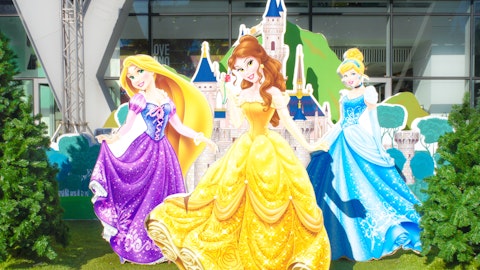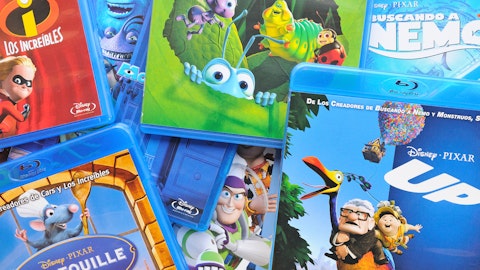I generally view the segments for theme parks & resorts, consumer products, and studio entertainment to be pretty intertwined. The company does offer a pretty diverse group of movies, and has been on a roll recently by unveiling a string of blockbusters. Studio entertainment accounts for close to 17% of profits. Disney can then utilize characters from those movies in its theme parks, where people pay more each year to get in and have a family vacation.
Those theme parks generate approximately 20% of company profits. Then, the company also earns 10% of earnings on consumer products which have those characters. I really like how the company has created its own ecosystem, where consumers see a movie, then go to a theme park to see characters from that movie, and then purchase products with the protagonists from those movies.
The challenges with movies is that they typically do not generate recurring revenue streams. However, the company has such a diverse group of movies, ranging from children’s, to action heroes, that it can monetize this content through channels like DVD sales, sales to TV channels etc. The thing about Disney’s content is that it is family friendly, which is why parents trust it and children enjoy it. This content can be used in the future, and be sold and repackaged in whatever transmission device people are or will be using in the future. As Warren Buffett has said about Disney, their children’s movies essentially are a perpetual royalty on youth.
The company of course does not only offer children’s movies. It has been on an acquisition spree, purchasing Lucas Films and Marvel. Those come with audiences which are willing to go to the theater and see the latest movies with their action heroes. Creating movies is a hit or miss game for studios. However, when you have an established franchise, the odds of producing a hit increase substantially. The ability to have sequels, and sell those sequels in other segments is a unique competitive advantage. That library is valuable, and could be monetized for years into the future.
The one risk I could think of is that Disney has been killing it in the box office recently. Generating blockbuster hits is something that should not be taken for granted however. If some of its movies flop, its earnings would decrease. This is why it is important to not get too excited as well, but consider risks to movies, entertainment and cable franchises. I am sure they will dig their way out of this however. Any short-term stumbles would likely present an opportunity to buy more shares at a discounted valuation.
The annual dividend payment has increased by 17.60% per year over the past decade, which is higher than the growth in EPS. Given the low payout ratio, I expect annual dividend growth over the next decade to exceed earnings per share slightly. I believe that Disney has what it takes to achieve dividend growth over time though not every year.
A 12% growth in distributions translates into the dividend payment doubling every five and a half years, on average. If we check the dividend history, going as far back as 1960, we could see that The Walt Disney Company has actually managed to double dividends almost every five and a half years, on average.






